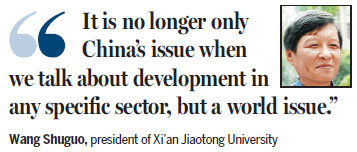Innovation and change needed for progress
By Du Juan in Xi'an (China Daily) Updated: 2016-04-05 08:11Higher education should serve the country's One Belt, One Road Initiative - the Silk Road Economic Belt and 21st Century Maritime Silk Road - and provide college students with more than just pure knowledge for their further development, a senior education expert said.
The Belt and Road Initiative is a Chinese economic development strategy that focuses on connectivity and cooperation among nations mainly from Asia to Europe.
Wang Shuguo, president of Xi'an Jiaotong University, said Chinese universities should no longer merely pay attention to rankings, but also accelerate structural adjustment of specialties and strengthen innovation.
In May last year, Xi'an Jiao tong University originated the Universities Alliance of the New Silk Road in Xi'an, capital of Shaanxi province, the starting point of the ancient Silk Road, in order to establish cooperative education platforms among member universities and advocate cooperation in the fields of inter-university exchange, nurturing talent, research collaboration, cultural exchange, policy studies and medical and health service cooperation.
He said around 100 universities from 22 countries have joined the alliance so far. Top national universities in countries including Thailand, Australia, South Korea, Pakistan and Russia will hold student exchange programs, establish joint-innovation centers and sign diversified agreements in different sectors.
The alliance has no threshold for universities that want to participate. There are no standards for the scale of the school or the countries where the schools are located, he said.
"As China's economic development grows, it is no longer only China's issue when we talk about development in any specific sector, but a world issue," Wang said. "Thus, we have to consider our issues from a world perspective."
Xi'an, located in the geographic center of China, should play a more crucial role in the country's educational, cultural and economic development, Wang said.
The central government should consider establishing more high-end think tanks in western China, and Xi'an is the best choice, he said.
For instance, energy is crucial for the country's economy. Universities should set up think tanks for energy research and development, with the central government's guidance.
"China's big science instruments and facilities are mostly located in developed coastal regions, which cannot satisfy the development of science in the western area," Wang said. "Shaanxi has rich higher education resources, which can contribute to the sector."
Fang Weifeng, director of the Development and Reform Commission of Shaanxi, said Shanghai Cooperation Organization University, which was initiated in 2008 by Russia, should set up a campus in Xi'an.
SCOU is a cooperation network, aiming at strengthening the mutual trust and good neighborly relations among member countries. Students from the member universities can communicate through the platform.
Fang said Shaanxi has the ability to establish a campus for this organization.
"Xi'an is the core place for educating western China's talent. Being the center of the country's transportation, trade and logistics, the city can contribute to a more balanced development between eastern and western China," Fang said. "If SCOU choose Xi'an as its campus location, it will help this process."

- One Belt and One Road Initiative becomes hot topic at the two sessions
- Research on Investment and Financing Mechanism for Infrastructure of "One Belt and One Road" Initiative
- Seminar casts light on "One Belt One Road" Initiative
- Outlines of the results of Seminar on China-Iran Cooperation for Development by "One Belt and One Road" Initiatives
- Forum's vision for One Belt One Road Initiative
- Xi's visit brings 'One Belt and One Road' cooperation to new level
- Hi-tech fair to showcase innovative energy along 'One Belt and One Road' countries
- Promoting the "One Belt and One Road" Initiative Requires the Awareness of Opportunity, Risks, Equality and Mutual Benefit
- Activists want dog festival taken off the menu
- 'Exotic names' will soon vanish
- Chinese 'parachute kids' flock to US
- Chinese writer wins top prize for authors of children's books
- Li: Tax reform to boost vitality of real economy
- Once-endangered pony makes comeback
- Xi's meeting with Obama 'eases tensions'
- Signs in Chinese would help France attract more visitors
- Bookshop worms way into community
- Chinese eye eco-burials as graveyards fill up








